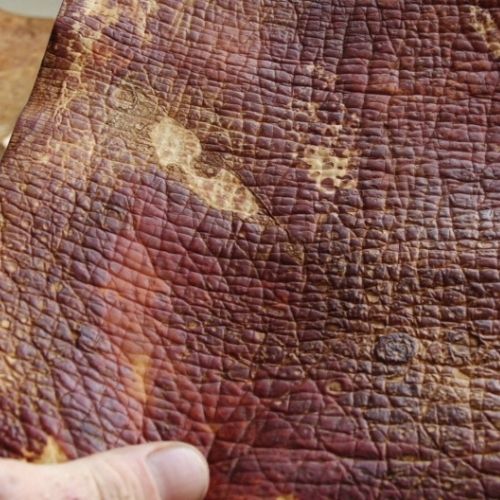Why to Shop Mycelium Leather
In response to a growing emphasis on sustainability and animal rights, many fashion industry leaders are shifting toward using eco-friendly materials in their products.
The leather industry is no exception. In the last few years, leather alternatives have been gaining popularity. Plastic-based leather products are no longer the only substitute for animal leather. Plant-based leather products are manufactured using cactus, cereals, pineapple, and even mushrooms.

What Is Mushroom Leather?
Mushroom leather is made from the substantial root-like structures of fungi, called mycelium. This interlaced and branching web of fibers naturally grows beneath the forest floor. It serves to transport vital nutrients to surrounding trees and other plants as well as support the soil structure.
Bold Threads, a California-based company specializing in material innovation, has developed a mycelium leather material known as Mylo. They have partnered with several leading fashion brands to bring Mylo products to the mainstream market in 2021.
What Are the Advantages of Products Made with Mylo?
Mylo can be used just like traditional leather materials made from animal hides or petroleum-based products. It can be dyed to have any color and is designed to be resistant to color fading. Mylo can be embossed and textured to look and feel shockingly similar to animal leather.
Mylo is strong and durable, without the environmental impact of animal- or plastic-based leather. Here are a few advantages of choosing to buy mycelium-based leather products.
- The manufacturing process is eco-friendly and entirely humane since there are no animals or petroleum byproducts used.
- Mylo is incredibly supple and soft, almost indistinguishable from animal leather.
- Bold Threads' supply chain partners meet or exceed top industry standards for sustainability certifications.
- The entire growing and fabrication process takes just a few short weeks.
- Support the growing use of animal- and eco-friendly materials in the fashion industry.
- Encourage more fashion brands to employ environmentally sustainable methods.
Material science has made incredible technological advancements in recent years. An ever-growing number of industry leaders are making the change to using sustainable materials in their products. The more we as consumers support environmentally friendly companies, the more sustainable alternatives will be available on the mainstream market.
How is Mylo Made?
The process of manufacturing mycelium leather starts with a bag of sawdust and other organic mulch material getting inoculated with live mushroom spores. The mycelium grows into a thick, foam-like mat in just a few weeks' time. This material is then processed, tanned, and dyed to make Mylo.
Starting in 2021, Mylo will be commercially available in products like footwear, sportswear, wallets, handbags, and phone cases, among others.
Why is Mylo More Sustainable Than Traditional Leather?
Mylo's production requires fewer resources and has a smaller environmental impact than animal agriculture or plastic fabrication. Growing mycelium uses less land, less water and generates fewer greenhouse gases than raising livestock. The process is also much faster, taking weeks as opposed to years.
There are numerous environmental hazards associated with the manufacture of plastic products. Toxic byproducts are released into the air and water supplies. Dangers to worker health include chemical fires, explosions, chemical spills, and inhaling toxic fumes, to name a few.
The process of creating Mylo is completely organic and humane. Mylo is certified as being bio-based, meaning that it's made using chiefly renewable materials that naturally exist in the environment today.
Mylo is created using a stringently designed procedure that emphasizes reducing its environmental impact at every stage of production. Bold Threads has intentionally partnered with supply chain companies that lead the industry in sustainability certifications.
Join the unleather revolution and use your power as a consumer to promote a sustainable future for the fashion industry and beyond.